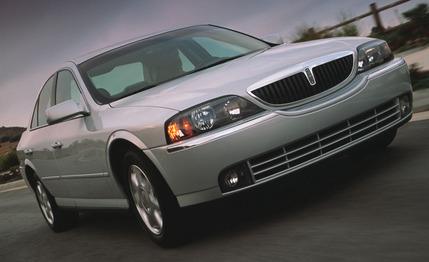 Short Take Road Test
Short Take Road Test
The generation that grew up with the dream of someday driving to the country club in a Cadillac, Chrysler, or Lincoln is mostly in assisted living these days. And precious few of their offspring would put a DeVille or Town Car (Chrysler withdrew from this league long ago) on the list of things to buy when they win the lottery.
The Europeans and Japanese reign here, and past attempts by Detroit to restore its dynasty - the Cadillac Cimarron of the early '80s comes to mind - are best forgotten. We may have contributed to this sad state by having little good to say about the overstuffed pullmans issuing from Detroit's luxury automakers in past decades - some readers even accused us of being anti-American - so it was with a degree of relief, if not hometown boosterism, that we found a lot to like about the Lincoln LS when it was introduced in 1999 as a 2000 model.
We road-tested it in 1999, compared it (with both V-6 and V-8 power) against other cars in its class three times - including the Jaguar S-type, which shares the LS's rear-wheel-drive platform - and subjected it to a 40,000-mile long-term test in 2001. The LS acquitted itself well right up to our "36 on the Floor" comparo (February 2002), where it came in last among seven six-cylinder competitors, far behind the winning BMW 330i. We felt the LS, now approaching middle age in car years, was just not keeping up with the competition in a cutthroat class where change is constant.
So when Lincoln announced that the 2003 LS would undergo extensive rejuvenation - claiming that "more than 500 components and systems have been redesigned" - we took another look at the LS, choosing as the object of our attention the V-8 Sport model.
The most apparent effect of these quantum changes is a not insubstantial improvement in performance by virtue of a 28-hp boost (to 280) to the LS's 4.0-liter DOHC V-8 engine. Compared with previous LS V-8s we've tested, the 2003 version lops a half-second off the 0-to-60 and quarter-mile times, hitting the marks in 6.7 and 15.1 seconds, respectively. Running up through the gears of its manumatic transmission is as much an aural as a physical pleasure - the engine sounds a bel canto tenor, and the transmission shifts with crisp precision.
The Sport suspension - with stiffer dampers and larger anti-roll bars - keeps the 235/50VR-17 Michelin Pilot HX MXM4 all-season tires squarely in contact with the pavement to generate a useful 0.84 g during ambitious driving. However, the body rolls severely when you're pushing this hard. On the other hand, the ZF steering, which Lincoln says is retuned to provide more feel, helps the LS track down the highway as if it were riding a homing beacon.
In the past, we've been impressed by the LS's heart-of-oak substance but found it to be a bit noisy. No more. Refinements to the car's sound package, powertrain, and body sealing have given the cabin a serene ambience. On a practical level, interior storage space has been increased - the center console has doubled in size - and the pedals are power adjustable. Less welcoming are instrument-panel graphics that look more Timex than Rolex and "satin-nickel accents" that coexist uneasily with an otherwise elegant and well-stitched-together interior.
One of the car's less successful changes is a nose-and-tail restyle, including a "signature Lincoln grille," which shifts the LS's look too close to that of Lincoln's antediluvian Town Car. We've always felt the LS's styling was too innocuously conventional and heavy-handed - its bumpers would be useful on a medieval siege engine - for what aspires to be a European-flavor sports sedan. This year's face lift makes it look even more like a livery-service hire car.
But looks are subjective. Price isn't. The as-tested tab on our long-term LS was $38,420. Three model years later, the bottom line has ballooned, with some options, to $47,390. During the same period, the stock market has tanked, interest rates have hit historic lows, zero-interest financing and depressed prices have kept auto sales going, and Lincoln thinks it can compete without a price advantage. Good luck. As exemplary as it may be, the LS lacks the reputation of its rivals - Lexus for its antiseptic perfection, Mercedes for its unassailable pedigree, and BMW for its arrogant dash. Intangibles, to be sure, but in this class, perceptions count.